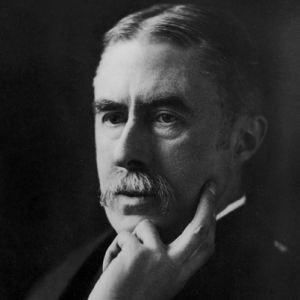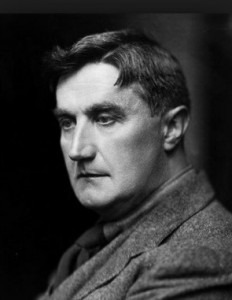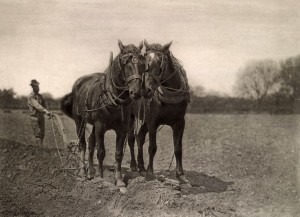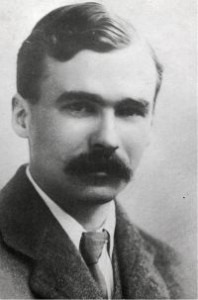
A.E. Housman
The poetry of the collection has also struck a chord with English composers, who have set many of the poems as songs. If we look at one poem, Is My Team Ploughing, and four different settings of it, we can hear how each influenced the next, until the final setting of only 10 years ago.

Ralph Vaughan Williams, c. 1920 (E.O. Hoppé)

A Team Ploughing, Peter Henry Emerson, 1887
Vaughan Williams: On Wenlock Edge: No. 3. Is my team ploughing? (Ian Partridge, tenor; The Music Group of London)
The setting of the poem by George Butterworth (1885-1916) in his song cycle Six Songs from A Shropshire Lad (1911) is quite different: it offers a much stronger contrast between the fail, fainting voice of the dead man and the hearty voice of the living. It’s only on the last lines that the hearty voice takes on a resonance of tenderness and that tells us everything we need to know about the situation. One of the most effective performances of this was by Peter Pears with Benjamin Britten at the piano, with the delicate balance between the interlocutors beautifully done.

George Butterworth, 1914
Even with its simple piano accompaniment, Orr’s setting has a more modern feel and the harmonies give us a more bittersweet feeling to the conversation.
Orr: Is My Team Ploughing (Mark Stone, baritone; Simon Lepper, piano)

Stephen Duro
Duro: Is My Team Ploughing? (Stephen Foulkes, baritone; David Bednall, piano)
From Vaughan Williams’ setting for voice and piano quintet to the following settings for voice and piano, we hear the growing freedom of the setting: the piano has become a commentator on the words rather than just an accompaniment, particularly in the last setting.
IS MY TEAM PLOUGHING
A.E. Housman
A Shropshire Lad, No. XXVII
“Is my team ploughing
That I was used to drive
And hear the harness jingle
When I was man alive?”
Ay, the horses trample,
The harness jingles now;
No change though you lie under
The land you used to plough.
“Is football playing
Along the river-shore,
With lads to chase the leather,
Now I stand up no more?”
Ay, the ball is flying,
The lads play heart and soul;
The goal stands up, the keeper
Stands up to keep the goal.
“Is my girl happy,
That I thought hard to leave,
And has she tired of weeping
As she lies down at eve?”
Ay, she lies down lightly,
She lies not down to weep:
Your girl is well contented.
Be still, my lad, and sleep.
“Is my friend hearty,
Now I am thin and pine,
And has he found to sleep in
A better bed than mine?”
Yes, lad, I lie easy,
I lie as lads would choose;
I cheer a dead man’s sweetheart,
Never ask me whose.
